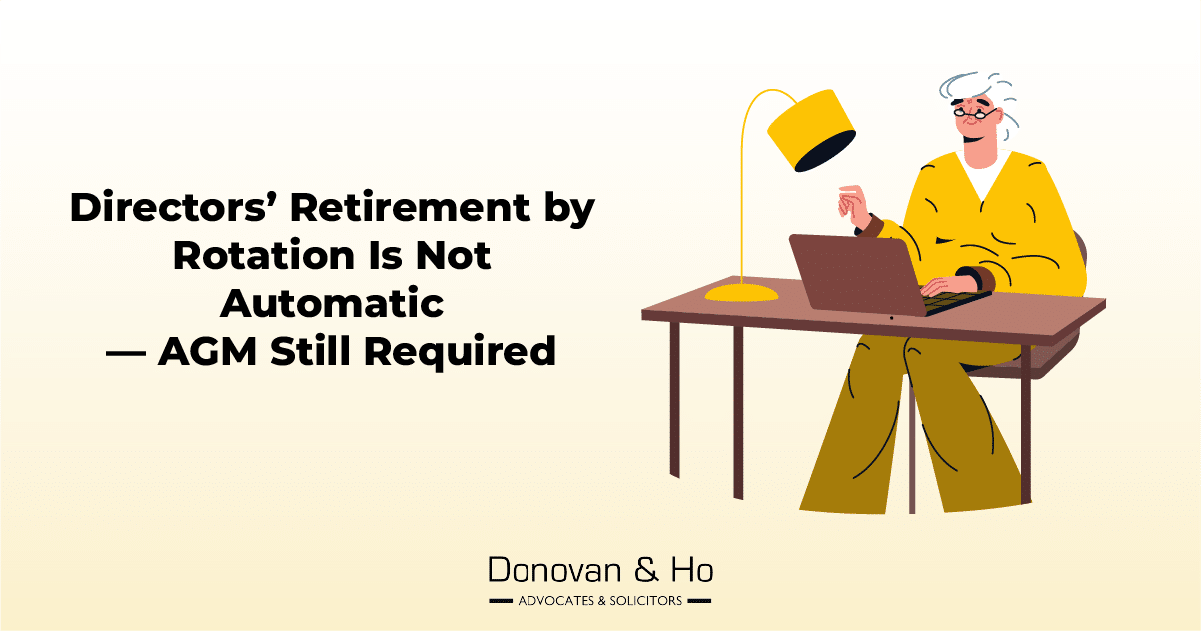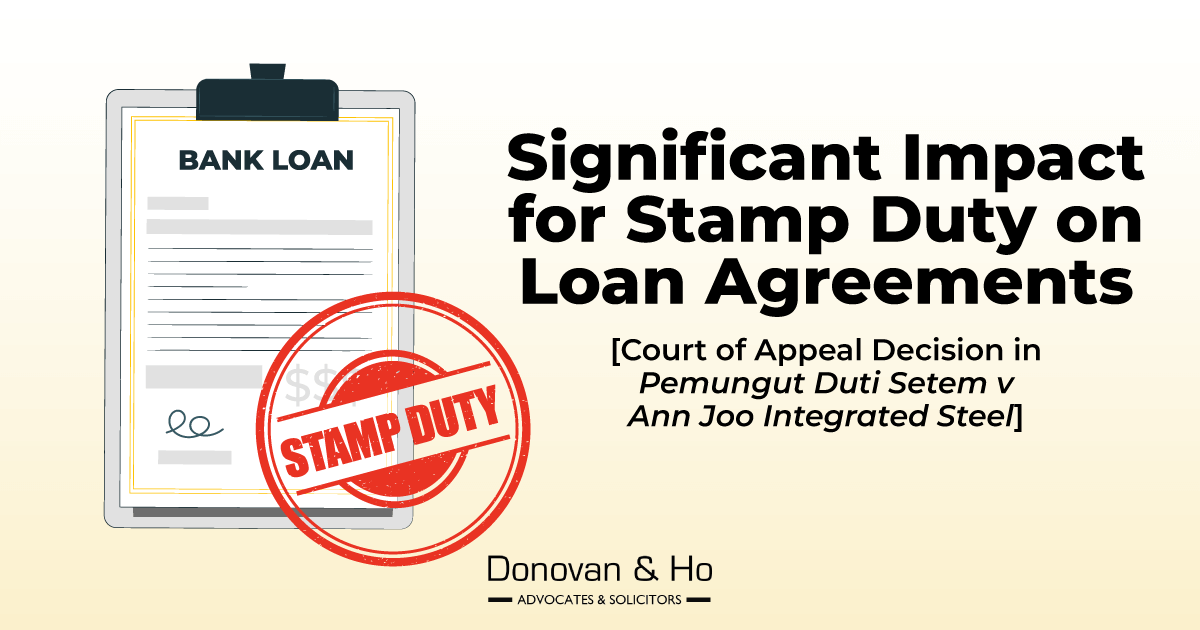In Dato’ Sri Andrew Kam Tai Yeow v Grandfoods Sdn Bhd & Anor and other appeals [2025] MLJU 819, the Malaysian Court of Appeal (“COA”) recently considered a specific legal question: whether a director scheduled to retire by rotation under the company’s Articles of Association (“Articles”) at a shareholders’ meeting, can be deemed automatically retired if such meeting is not held and the period for holding it has lapsed?
Case Background
The appellant, Dato’ Sri Andrew Kam Tai Yeow (“DS Kam”), was a director of several private companies including the two respondents, Raub Mining & Development Company Sdn Bhd (“first respondent”) and Raub Oil Mill Sdn Bhd (“second respondent”). In August 2017, each respondent issued notices to convene extraordinary general meetings in September 2017, which included a motion to remove DS Kam as director. In response, DS Kam filed injunction applications to restrain the respondents from removing him as director and holding any general meeting.
While the injunction was still in effect, DS Kam requested from the respondents for their financial statements, ledgers and certain contractual documents. The respondents rejected his request, claiming that he had ceased to be a director, and therefore losing his right to the documents. DS Kam objected, asserting that the injunction in place had preserved his director’s office.
Following this, DS Kam filed two originating summons (“OS”) suits against the respondents seeking access to the requested documents, while the respondents filed suits against DS Kam seeking declarations that DS Kam had automatically retired from the board due to lapse of time without any general meeting held.
Parties’ Contentions
The respondents contended that under their respective AA, DS Kam had been automatically deemed retired as director on 31 December 2018 for the first respondent and 31 December 2017 for the second respondent. These dates represent the end of the years in which the respective Annual General Meetings (“AGMs”) should have been held, and by which DS Kam was supposed to have retired by rotation (but for the injunction).
The relevant provisions of the respondents’ Articles read as follows:
|
First Respondent |
Second Respondent |
|
Article 70: At the first ordinary meeting of the Company the whole of the Directors and in every subsequent year one third of the Directors for the time being or if their number is not a multiple of three then the number nearest to one third shall retire from office. |
Article 95: At every ordinary general meeting one of the elected Directors shall retire from office and shall be eligible for re-election. |
|
Article 71: (a) The Directors to retire in every year shall be those who have been longest in office since their last election but as between persons who became Directors on the same day those to retire shall (unless they otherwise agree among themselves) be |
Article 96: The one director to retire as aforesaid at the first ordinary meeting shall, unless the directors agree among themselves, be determined by lot; but in every subsequent year the one who has been longest in office shall retire. As between two or more who have been in office an equal length of time the director or |
|
determined by lot. (b) A retiring Director shall be eligible for re-election. |
directors to retire shall in default of agreement between them be determined by lot. The length of time a director has been in office shall be computed from his last election or appointment where he has previously vacated office. A retiring director shall be eligible for re-election and shall act as a director throughout the meeting at which he retires. |
DS Kam conversely argued that the Articles do not provide expressly or impliedly for automatic retirement of directors in the absence of an AGM. In fact, they contain exhaustive lists of situations that would trigger automatic vacation of office of directors, but retirement by rotation without an AGM is not among those situations. Therefore, since no AGM was held, and the Articles only allow for retirement at AGM, the issue of his retirement simply did not arise.
High Court’s (“HC”) Decision
In favour of the respondents, the HC ruled that DS Kam had retired from the boards of both respondent companies, and dismissed DS Kam’s two OS. In particular, the HC held that:
- a director who is due for retirement at an AGM of a certain year, will retire automatically even if no AGM was held in that year;
- this was based on the principle that a director on appointment does not ordinarily step into an office perpetually. Unless terminated, a director’s office is limited by the terms of the company’s Articles.
As such, director can be automatically vacated through retirement by rotation, or be deemed retired even in the absence of an AGM in line with the respondents’ Articles.
Court of Appeal’s Findings
The COA overturned the HC’s decision, and ruled in favour of DS Kam’s submissions on the following key grounds:
(a) Unambiguous wording in Articles: The Articles are explicit that retirement of directors happens at general meetings where they will also be eligible for re-election. There is no express or implied provision in the Articles that provides for automatic vacation of office via retirement in the absence of an AGM.
(b) Retirement by rotation comes with eligibility for re-election: The retiring directors, either due to retirement by rotation or having been appointed to fill a casual vacancy, generally have the right to seek re-election. In that sense, the retirement and re-election are intertwined and are but a single process at the shareholders’ meeting – which is an important aspect of shareholder democracy. If a directorship is merely deemed terminated by retirement upon the expiry of a time period without a shareholders’ meeting, that director is deprived of his right to stand for re-election and the shareholders are likewise denied the opportunity to vote on the re-election proposal and the continued service of that individual as a director.
(c) Statutory right of re-election: Although Section 205 Companies Act 2016 did not strictly apply in this case (as the Articles have covered the subject), the COA found the following statutory framework supported DS Kam’s case:
- S205(3): Retirement is to happen at the conclusion of general meeting.
- S205(5): Retiring directors shall be eligible for re-election at the same general meeting.
- S205(6): If no director is appointed to fill in vacancy of retiring director, the retiring director, shall, if he offers himself for re-election, be deemed to have been re-elected, unless the shareholders’ meeting resolved not to fill the vacated office, or not to re-elect such retiring director.
(d) Articles do not provide for deemed retirement due to absence of AGM: The Court noted that both respondents’ Articles include specific lists of circumstances where a director automatically vacates office, but retirement by rotation without an AGM is not one of them. This reinforces the proposition that does not find favour with the deemed retirement approach.
Key Takeaways for Company Directors
- A director due for retirement by rotation does not automatically retire if an AGM is not held within the prescribed period. Retirement and re-election must occur at the same AGM, preserving both the director’s right to seek reelection and the shareholders’ right to vote.
- Companies should therefore ensure AGMs are convened within the statutory timeframe and in compliance with their Constitution to avoid governance and compliance risks.
- This decision also reinforces corporate democracy, preventing potential abuse where AGMs are intentionally delayed by the majority directors to remove a director or bypass shareholder voting rights.
***
This article was written by Chin Wan Xin (Associate) from Donovan & Ho’s corporate practice.
Our corporate practice group advises on corporate acquisitions, restructuring exercises, joint venture arrangements, shareholder agreements, employee share options and franchise businesses, Malaysia start-up founders and can assist with venture capital funds in Seed, Series A & B funding rounds. Feel free to contact us if you have any queries.






